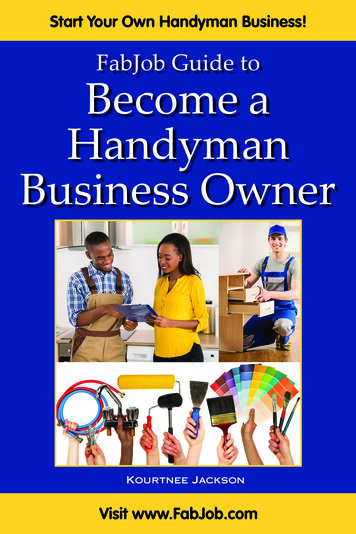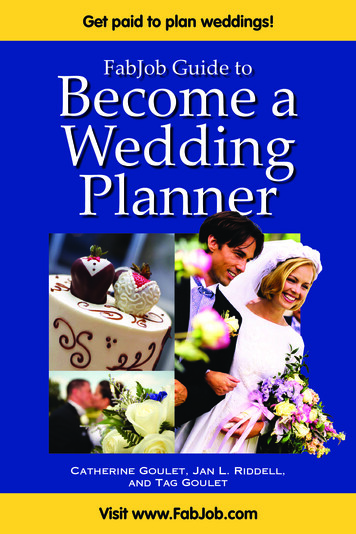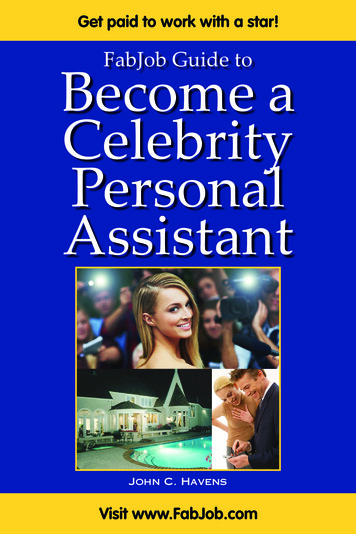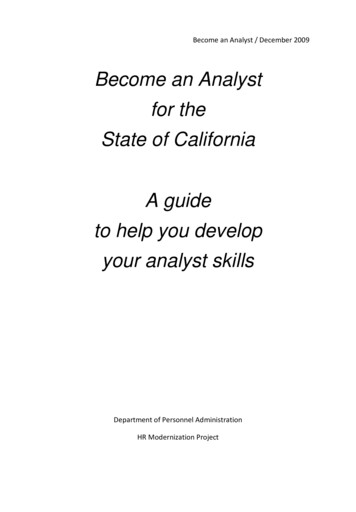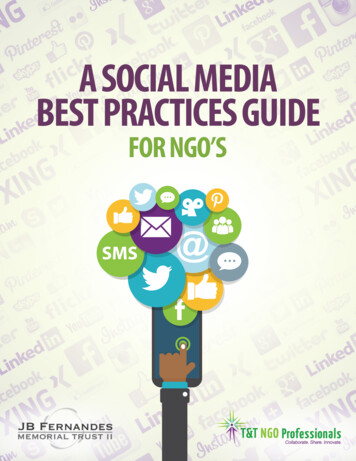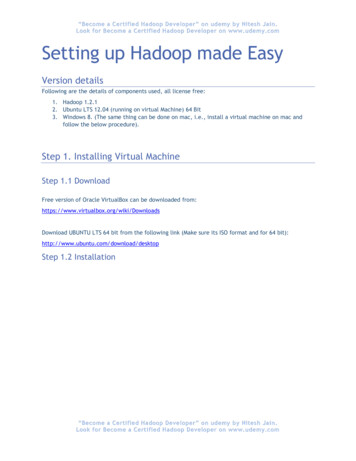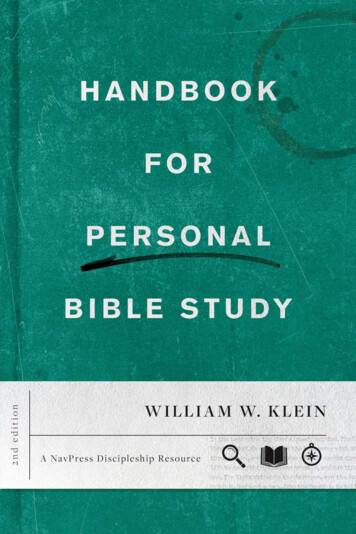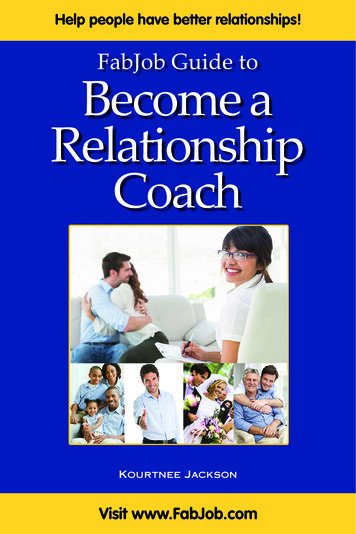
Transcription
Help people have better relationships!FabJob Guide toBecome aRelationshipCoachKourtnee JacksonVisit www.FabJob.com1
FabJob Guide to Become a Relationship CoachContentsHow to Use This Guide.3Acknowledgements.71. Introduction.81.1 The Need for Relationship Coaches.91.2 What is a Relationship Coach?.102. Relationship Coaching Fundamentals.142.1 Client Demographics .152.2 Couples Coaching.162.3 Divorce Coaching.172.4 Coaching Groups . .182.4.1 Presenting a Group Coaching Session.192.4.2 Group Coaching Considerations.242.5 Singles Coaching.252.6 Family and Adolescent Coaching .262.7 Growing Relationship Coaching Markets.272.8 Providing Relationship Coaching Services.302.8.1 Initial Consultation and Intake Session.312.8.2 Relationship Assessment Tools.392.8.3 Tools for Changing Behaviors.442.8.4 Other Tools and Exercises.462.8.5 Relationship Coaching Examples.582.9 Delivering Relationship Coaching Services.602.9.1 Events for Couples and Singles.623. Getting Ready.723.1 Skills Assessment .723.2 Skills and Knowledge You Will Need.732 fabjob.com Copyright 2020 FabJob Inc.
FabJob Guide to Become a Relationship Coach3.2.1 Coaching Skills or Knowledge.733.2.2 Interpersonal Skills.743.2.3 Business Skills.773.3 Hands-On Learning .773.4 Learn From Other Business Owners.793.4.1 Information Interviews.793.4.2 Mentoring.823.4.3 Associations.853.4.4 Certificate Programs.873.4.5 Packaged/Branded Coaching Systems.883.4.6 Business Courses.883.5 Resources for Self-Study.903.5.1 Books and Magazines.903.5.2 Websites.904. Starting Your Own Business.924.1 Getting Started as a Professional Relationship Coach.944.1.1 Creating a Business Plan.944.1.2 Choosing a Business Legal Structure.1024.1.3 Choosing a Business Name .1084.1.4 Choosing Your Location.1104.2 Financial Matters.1134.2.1 Start-up and Operating Expenses.1134.2.2 Start-up Financing .1184.2.3 Taxes.1234.2.4 Insurance.1244.3 Setting Your Fees .1284.3.1 Calculating an Hourly Rate.1294.3.2 Fees for Individuals.1324.3.3 Group Coaching Fees.135Copyright 2020 FabJob Inc. fabjob.com 3
FabJob Guide to Become a Relationship Coach4.3.4 Fees for Corporate Clients.1394.3.5 Retainers.1404.3.6 Getting Paid.1404.3.7 Keeping Track of Your Finances.1464.4 Working with Support Staff.1504.4.1 Employees versus Contractors.1514.4.2 Before You Hire.1524.4.3 Finding Support Staff.1544.4.4 The Interview Process.1554.4.5 References.1575. Attracting Clients.1595.1 Choose Your Target Market.1605.2 Marketing Tools.1635.2.1 Printed Materials.1635.2.2 Your Website.1715.2.3 Social Media .1765.3 Marketing Techniques.1805.3.1 Advertising.1815.3.2 Free Media Publicity.1855.3.3 Networking.1905.3.4 Your Elevator Pitch.1945.3.5 Promotional Events.1985.4 Partnerships.2025.5 Selling Your Services.2035.5.1 Responding to Inquiries.2035.5.2 Contacting Corporate Clients.2065.5.3 Meeting with a Prospective Client.2075.6 Client Contracts.2116. Conclusion.2174 fabjob.com Copyright 2020 FabJob Inc.
FabJob Guide to Become a Relationship Coach1. IntroductionCourage means to keep working a relationship, to continue seeking solutionsto difficult problems.–Dennis WaitleyAs a relationship coach, you can have a rewarding career helpingpeople to have better relationships. This may be an ideal career for youif you can answer “yes” to the following two questions: Do you havean interest in interpersonal relationship dynamics? Do you like helpingpeople?“Everyone says it, but you have to mean it: you have GOT to wantto HELP people,” according to Thomas Gagliano, MSW, a successfulrelationship coach and author, in response to our request for advice forprospective relationship coaches.“Don’t do it because of the money or have any other motivation for acareer in coaching,” he added. “As coaches we are often dealing withpeople right in the middle of their problems so they will need morepatience, more care, more empathy. If that’s not the motivation, nothingelse matters.”Copyright 2020 FabJob Inc. fabjob.com 5
FabJob Guide to Become a Relationship CoachWhile relationship coaches most commonly help their clients improveromantic or family relationships, relationship skills can be helpful in allspheres of life, including the workplace.1.1 The Need for Relationship CoachesBy choosing to become a relationship coach, you have entered acoaching market with healthy growth potential.There are currently hundreds of relationship coaches throughout theUnited States and Canada, about half of whom hold credentials astherapists or counselors. Roughly two-thirds of relationship coachesare women, as well as several husband-and-wife teams. While thisbranch of life coaching is still relatively new, its potential for continuedgrowth looks promising.The numbers behind the growing need for relationship coaching arestaggering. Although exact figures are not available, the divorce rateis a partial proxy of demand for relationship coaching. In the 1960s, 20percent of first marriages ended in divorce. Today, 40 to 50 percent offirst marriages end in divorce, and the rate is even higher for secondand third marriages.A comprehensive overview of research on divorce, which makes goodreading for anyone considering a career as a relationship coach, hasbeen published by family law attorneys Wilkinson and Finkbeiner attheir website. Among their findings: Every hour, 277 divorces take place in the United States Sixty percent of those divorces will take place before the spousesturn 40 Many of these divorcees will become involved in otherrelationships and some remarriagesPeople may play the online dating game for months or years and enterinto several short and long-term relationships. The children of a divorcewill likely have more than two parental figures while growing up.As a result, most people will have many more intimate relationshipsthan our grandparents, who were married ‘until death do us part.’’6 fabjob.com Copyright 2020 FabJob Inc.
FabJob Guide to Become a Relationship CoachTo manage our numerous and more complex relationships, moreand more of us are turning to relationship coaches to help us developstrong, healthy relationships with the people who are important to usin our lives.Two key trends are driving the increase in demand for relationshipcoaching. For couples, the removal of the stigma around marriage anddivorce counseling has opened the door to over 50 percent of couplesseeking some form of relationship advice at least once.The second trend is singles being proactive and seeking relationshipadvice early, even as early as the pre-dating stage. While couples makeup the majority of people seeking relationship advice, singles are nowthe fastest growing segment of the market.Divorced and widowed individuals are the least content, according tosingles expert Dr. Bella DePaulo, writing in Singled Out: How SinglesAre Stereotyped, Stigmatized, and Ignored and Still Live Happily Ever After.Never-married singles are also in search of improved life satisfaction.On a scale of 1 to 4, the currently-married rate 3.3, always-single 3.2,divorced 2.9, and widowed 2.9. True relationship bliss eludes eventhose who are ‘happily’ married. Meanwhile, 40 percent of adults todayare single, but very few are blissfully single; many are looking for love.According to this satisfaction survey, potential clients across all typesof relationships could possibly benefit from your services. The demandfor relationship coaching is high and growing, confirm the practicingcoaches interviewed for this guide.1.2 What is a Relationship Coach?Since Sigmund Freud began to treat patients with talk therapy onhis famous couch, many people have talked about their past topsychiatrists, psychologists, counselors, and other mental healthprofessionals. Relationship coaching, in contrast, focuses on yourpresent state and your future goals. Relationship coaches then takeconcrete action to help you reach your goals.Copyright 2020 FabJob Inc. fabjob.com 7
FabJob Guide to Become a Relationship CoachWhat a Relationship Coach is NotCounselor – Coaches are not considered counselors. Counselingis a type of talk therapy in which the client discusses hisproblems while the counselor provides guidance and advice,and possible exercises. Counseling is typically performedin a pre-scheduled series of six-to-ten sessions, and more ifrequired. At a minimum, counselors hold a bachelor’s degreein psychology or social work, and many have a master’s degree.Psychotherapist – While psychotherapists may providecoaching, coaches are not psychotherapists. Psychotherapyfocuses on talking about past issues to understand and resolveproblems in the present, and often occurs in a clinical setting.Psychologist – While many psychologists are relationshipcoaches, relationship coaches are not psychologists and shouldnever provide advice on mental health issues, such as clinicallydiagnosing depression, anxiety disorders, psychosis, and so on.Coaches should also avoid counseling someone experiencingviolence in a relationship.Relationship coaches are called on to fix many problems: Unresolved issues: “We keep having the same old arguments,over and over again!” Lack of communication: “I feel as though I am talking to a wall.He is detached and never at home.” Displaced anger: “Lose weight. Stop drinking beer.’ All she doesis nag, nag, nag!” Lack of trust: “He says he is working late, but after the affair I nolonger trust him!” Lack of confidence: “I lack the confidence to put myself out thereafter 20 years of marriage and two kids.”8 fabjob.com Copyright 2020 FabJob Inc.
FabJob Guide to Become a Relationship CoachA relationship coach has a number of tools and techniques at his or herdisposal to help: Solve problems Break cycles Build trust Teach communication skills Address co-dependency Provide anger management Assess compatibility Practice nonviolent communication Develop assertiveness Teach conflict management Rekindle loveIn This GuideIn the next chapter, we will introduce you to the tools and techniquesneeded to be a relationship coach. We’ll discuss major relationshipcoaching specializations and growing markets. Who are the peopleseeking relationship coaching? What is their motivation for seekingcoaching? You will then be introduced to ways to provide relationshipcoaching services, including coaching tools and techniques you can useto help people solve relationship problems and improve relationshipskills. This chapter can help you determine which particular coachingtools and techniques will work best for your own relationship coachingbusiness.Chapter 3 will prepare you for becoming a relationship coach,providing educational resources and tips for business, coaching,and communication. Finding associations, mentors, and certificationprograms to enhance your skills as a relationship coach will also beoutlined.Copyright 2020 FabJob Inc. fabjob.com 9
FabJob Guide to Become a Relationship CoachChapter 4 rolls out the carpet into the world of entrepreneurship,showing you how to set up a business, set fees, and manage yourclients seamlessly. You will have access to sample contracts, letters, andtestimonials. The business side of coaching is crucial to your success asthe owner of a relationship coaching business.Finally, chapter 5 explores ideas for marketing your relationshipcoaching services. In addition to working with couples, as a relationshipcoach you might choose to offer coaching for singles seeking a partner,family members (such as parents and children), or business peoplewho want to have better relationships with a business partner or coworkers. This chapter provides information about all of these markets,plus relationship coaching specializations that are growing.You have reached the end of the free sample of the FabJob Guide toBecome a Relationship Coach. To order and download the completeguide go to 0 fabjob.com Copyright 2020 FabJob Inc.
1 Help people have better relationships! FabJob Guide to Become a Relationship Coach Visit www.FabJob.com Kourtnee Jackson
